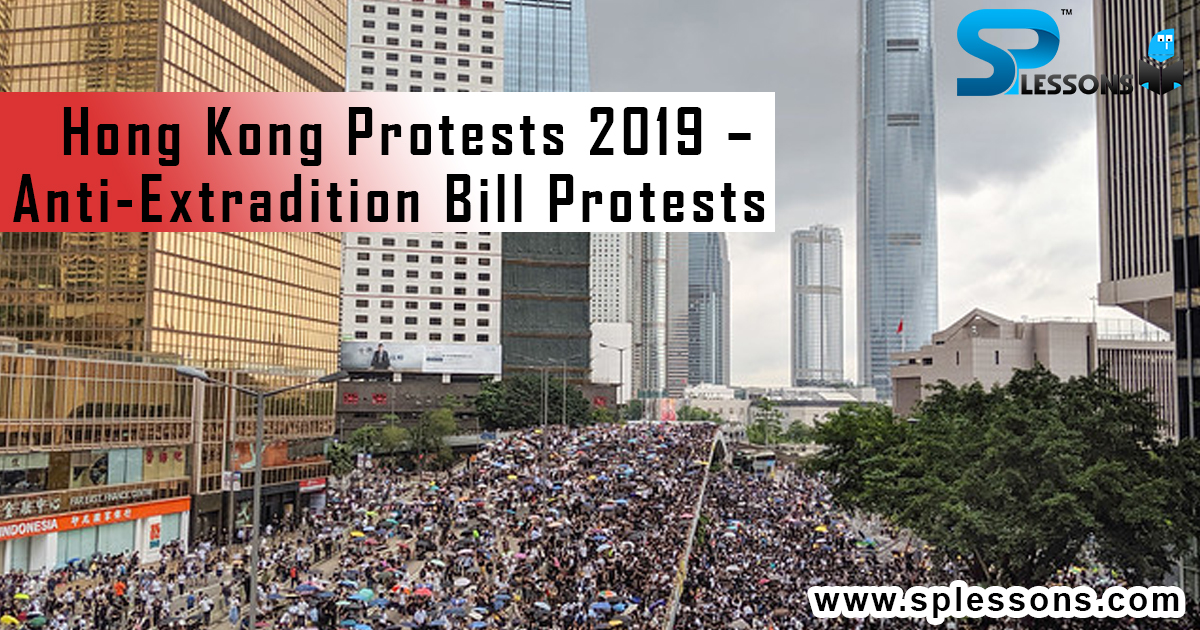 Introduction
Introduction
Hong Kong Protests against Extradition Law Protests have gripped Hong Kong since June 2019, sparked by highly controversial legislation to extradite those convicted of crimes to mainland China and Taiwan.
What is happening in Hong Kong?
- People are protesting in Hong Kong against the extradition law.
- This bill has been proposed because a Hong Kong man strangled his pregnant girlfriend while they were in Taiwan in 2018 and then he fled back to Hong Kong.
- And because of no formal extradition treaty of Hong Kong with Taiwan, he could not be sent back for trial. That's why the amendment was proposed to have extradition treaties with Hong Kong.
- But this includes mainland China also, a nation that will forcibly imprison its people if the state dislikes them.
- So people are worried that China would take advantage of the law.
Did you know?
Extradition – An act where one person (accused/convicted) is delivered to one country by the other.
Umbrella Blossom: The story of the Hong Kong Protests from 2014 to 2019
 Demands
Demands
What are people protesting about?
- At present, Hong Kong protestors have five specific demands.
- But the main reason for the protest is getting rid of the extradition bill. In February 2019, the Hong Kong administration introduced the bill.
- Secondly, they want the government to delete the use of the term “riot” as a classification of demonstrations.
- Their third demand was that the police release all the protestors imprisoned and dismiss the charges filed against the protestors.
- Demand four calls on the government to conduct a detailed and transparent inquiry against the Hong Kong police and their strategies.
- Fifth, the protestors are calling for democratic rule, not the form of Beijing. They want to choose their leaders democratically.
 Protesting
Protesting
Who all are protesting?
- Most of the demonstrators were young students and professionals in their late teenage years and twenties who were born in 1997. They are afraid that Hong Kong in which they have grown up, the unique culture, traditions, and personal liberty will go away. And it's not only young people who are demonstrating.
- In June, not less than 2 million individuals participated in the demonstration, out of 7 million population of Hong Kong.
- Trade unions went on a solidarity strike.
- There were approximately 200 doctors, nurses, and ambulance staff gathered in protest. Bankers conducted a protest in the central business district of Hong Kong in August that was called “Freedom Lose, market snooze”.
- In late July, a rally against the police for an end to the violent behavior was held on the streets of Hong Kong by tens of thousands of protestors, mostly middle-aged or older.
- Some of the super-rich businessmen in Hong Kong are also getting tired of the demonstrations and the disturbance it causes to their revenues.
Did you know?
Solidarity Strike – Industrial action is done by the trade union in support of strike initiated by workers in a separate corporation
 Government
Government
How is the Chinese government reacting to the protest?
- China has taken a stronger stand towards the demonstrations in Hong Kong because it considers them as a direct threat to its increasing impact on Hong Kong.
- China initially reacted to the protests with the excuse that they did not exist. But it has altered when the protests continued and in the latest weeks, the propaganda and the hate campaign in China have increased.
- China also states that by continuing to pay demonstrators, the West particularly the USA and the CIA tries to encourage tensions in Hong Kong.
- China’s propaganda towards the demonstrators is particularly troubling. China called the activities of demonstrators “near terrorism”, after the airport protests.
- China also gathered soldiers and tanks around the Hong Kong boundary in Shenzhen and posted videos on the military training.
Did you know?
Shenzhen - A major city in Guangdong Province, China
 Community
Community
How has the UK and the international community responded?
- The international community’s reaction so far has been slightly ineffective. Some nations published travel restrictions to Hong Kong in consideration of the current protests.
- At the start of the protest, the Foreign Secretary Jeremy Hunt advised the government in Hong Kong to have a meaningful discussion and adopt measures to protect the rights and liberties of Hong Kong and the great degree of independence that promotes its global reputation.
- The British Embassy opened its doors for protestors who required shelter in Hong Kong.
- At Chatham House in mid-July, PM Theresa May declared that the Sino-British Joint Declaration must follow the international laws and China must cooperate with them.
- At a conference with Chinese Foreign Minister on 2nd August 2019, Foreign Secretary replied some questions concerning Hong Kong demonstrations. Raab favored peaceful demonstration as a fundamental human right on both sides.
- However, the UK has its political crisis in Brexit at the moment, and if the UK disintegrates with the European Union, then it doesn't want to risk isolating China and its economy.
- Speaker of the House of Representatives and Senate Majority Leader, both published declarations of support and assistance to the demonstrators.
- Trump said previously in this month that he was worried about Hong Kong but then proposed if Xi went to settle down with demonstrators, he could work it out in 15 minutes.
- On August 19, Trump ordered China to fix the issue peacefully after the huge protest the day before, stating that this would be much problematic to sign an agreement if the Chinese President did something very violent and aggressive in Hong Kong.
- During the Summit, the Minister of Foreign Affairs said that India will not remark over other nations’ domestic matters and asks other nations to do the same.
- Indian travelers shall contact the Indian Embassy in China to prevent any difficulties until normality in their airport activities is regained, said the Minister of External Affairs.
- The European External Service said that the individuals of Hong Kong applied their fundamental right to gather and speak properly. Such rights must be respected.
- European Union banned supplying weapons to Hong Kong police.
Did you know?
Embassy – One country’s diplomatic office in the other country.
 Movement
Movement
What was the umbrella movement?
- The Umbrella Movement was a political movement that arose on 26 September 2014. Initially, the term “Umbrella Revolution” was created by Adam Cotton on 26 September 2014. But some important members later dropped the name and suggested the name “Umbrella Movement” because they were concerned that the movement would be considered as violent overthrow of the government.
- This movement emerged as demonstrations towards democracy in Hong Kong. Its name came from the use of umbrellas as a means of non-violent resistance to pepper spray used by the Hong Kong police to control the crowd, which was demanding more transparency in the elections. It was caused by the judgment of the Standing Committee of NPCSC on 31 August 2014 that recommended the specific initial evaluation of applicants for the elections of Hong Kong’s Chief Executive.
- This movement consists of tens of thousands of individuals. But the requests for cancellation of NPCSC decision were made mainly from the groups such as Scholarism, Hong Kong Federation of Students and Occupy Central with Love and Peace (OCLP). Ever since the beginning of demonstrations in 2014, members of the movement have claimed harassment by the political opposition members which are comparable to the long term targeting and imprisonment of mainland Chinese protestors and their relatives for their involvement in events of demonstrations.
Did you know?
NPCSC –
- It means the Standing Committee of National People’s Congress.
- The standing committee is the permanent body of






